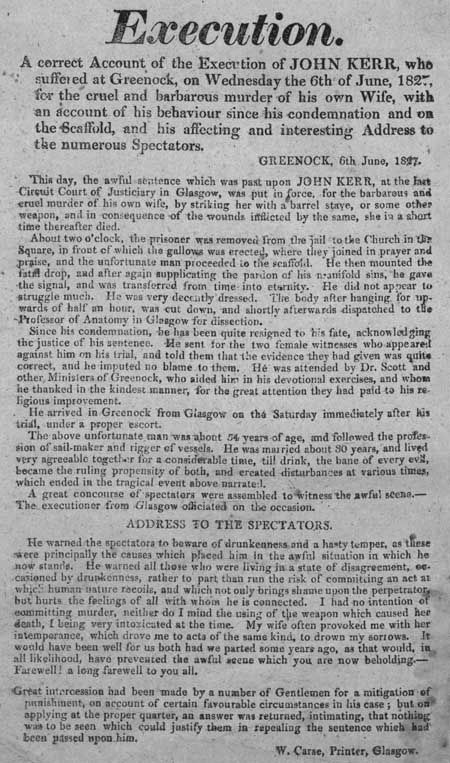Transcription
Execution. A correct Account of the Execution of JOHN KERR, who
suffered at Greenock, on Wednesday the 6th of June, 1827,
for the cruel and barbarous murder of his own Wife, with
an account of his behaviour since his condemnation and on
the Scaffold, and his affecting and interesting Address to
the numerous Spectators. GREENOCK, 6th June, 1827. This day, the awful sentence which was past upon JOHN KERR, at the last
Circuit Court of Justiciary in Glasgow, was put in force, for the barbarous and
cruel murder of his own wife, by striking her with a barrel stave, or some other
weapon, and in consequence of the wounds inflicted by the same, she is a short
time thereafter died. About two o'clock, the prisoner was removed from the jail to the Church in the
Square, in front of which the gallows was erected, where they joined in prayer and
praise, and the unfortunate man proceeded to the scaffold. He then mounted the
fatal drop, and after again supplicating the pardon of his manifold sins, he gave
the signal, and was transferred from time into eternity. He did not appear to
struggle much. He was very decently dressed. The body after hanging for up-
wards of half an hour, was cut down, and shortly afterwards dispatched to the
Professor of Anatomy in Glasgow for dissection. Since his condemnation, he has been quite resigned to his fate, acknowledging
the justice of his sentence. He sent for the two female witnesses who appeared
against him on his trial, and told them that the evidence they had given was quite
correct, and he imputed no blame to them. He was attended by Dr. Scott and
other Ministers of Greenock, who aided him in his devotional exercises, and whom
he thanked in the kindest manner, for the great attention they had paid to his re-
ligious improvement. He arrived in Greenock from Glasgow on the Saturday immediately after his
trial, under a proper escort. The above unfortunate man was about 54 years of age, and followed the profes-
sion of sail-maker and rigger of vessels. He was married about 30 years, and lived
very agreeable together for a considerable time, till drink, the bane of every evil,
became the ruling propensity of both, and created disturbances at various times,
which ended in the tragical event above narrated. A great concourse of spectators were assembled to witness the awful scene.?
The executioner from Glasgow officiated on the occasion. ADDRESS TO THE SPECTATORS. He warned the spectators to beware of drunkenness and a hasty temper, as these
were principally the causes which placed him in the awful situation in which he
now stands. He warned all these who were living in a state of disagreement, oc-
casioned by drunkenness, rather to part than run the risk of committing an act at
which human nature recoils, and which not only brings shame upon the perpetrator,
but hurts the feelings of all with whom he is connected. I had no intention of
committing murder, neither do I mind the using of the weapon which caused her
death, I being very intoxicated at the time. My wife often provoked me with her
intemperance, which drove me to acts of the same kind, to drawn my sorrows. It
would have been well for us both had we parted some years ago, as that would, in
all likelihood, have prevented the awful scene which you are now beholding,?
Farewell! a long farewell to you all. Great intercession had been made by a number of Gentlemen for a mitigation of
punishment, on account of certain favourable circumstances in his case ; but on
applying at the proper quarter, an answer was returned, intimating, that nothing
was to be seen which could justify them in repealing the sentence which had
been passed upon him. W. Carse, Printer, Glasgow.
View Commentary | Download PDF Facsimile
|
 |
Date of publication:
1827 shelfmark: L.C.Fol.73(096)
 View larger image
View larger image
|


